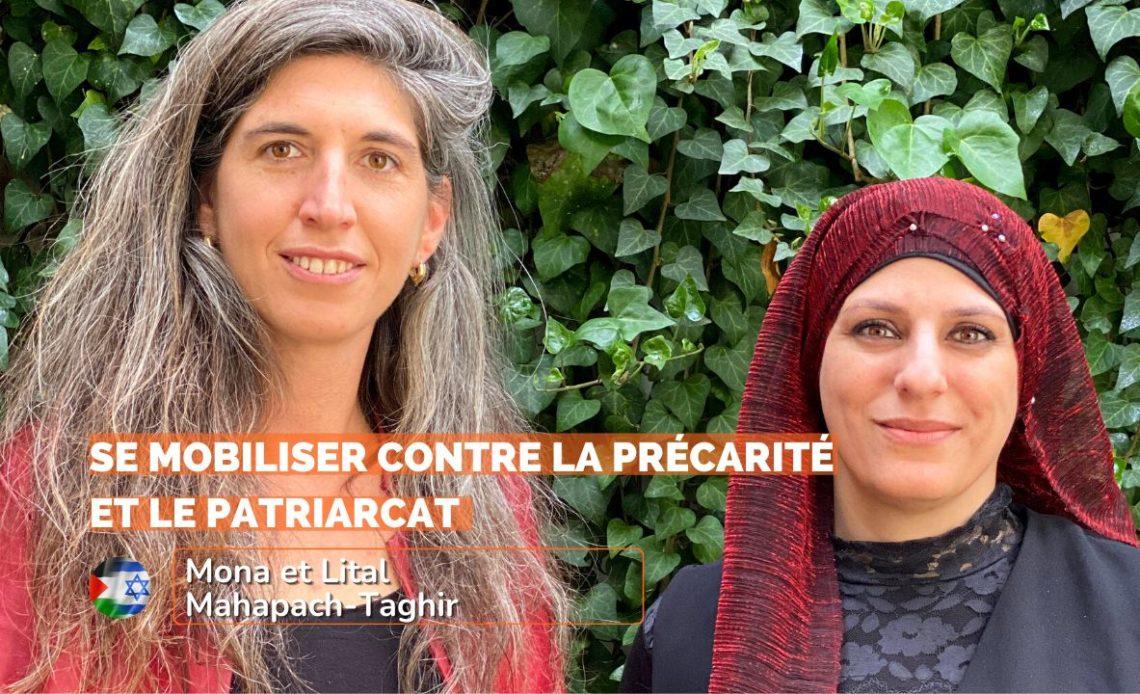
(English version below) Mona et Lital sont toutes les deux co-directrices de l’organisation Mahapach-Taghir. Elles sont engagées, féministes, et leur amitié respire la complicité militante. Elles viennent de milieux complètement différents et elles s’allient aujourd’hui autour de leur engagement pour plus de justice, en particulier pour les communautés précaires.
Mona est de la communauté Yafat El Nassera, elle s’est mariée à 16 ans, elle est maman de cinq filles et elle en est fière. Voir des personnes de sa communauté participer aux activités de Mahapach-Taghir attise sa curiosité ! Lorsqu’on lui explique que c’est un projet juif et arabe, ça l’étonne encore plus, elle qui n’avait jamais encore rencontré de personnes juives alors qu’elle a la citoyenneté israélienne. Elle commence à participer aux événements et est très inspirée par les personnes qui demandent le changement, ici et maintenant. Elle se dit qu’elle aussi, elle voit de nombreux défis dans sa communauté et qu’il est temps de faire bouger les choses. Elle finit par porter une mobilisation sans précédent pour que son village soit accessible en transport en public, après plusieurs années de plaidoyer, elle y arrive. Elle rêve aussi d’aller à l’université, et après avoir traversé les barrières culturelles, administratives, symboliques, elle y arrive et elle est aujourd’hui diplômée en management des ressources humaines. Au fur et à mesure de son engagement, elle prend conscience de son féminisme et de sa force. Elle crée même une branche en non-mixité de femmes au sein de l’organisation. Elle sait alors qu’elle ne sera plus jamais comme avant !
Lital est juive et nous partage qu’elle fait partie de la majorité de ce pays, de son élite économique et culturelle. C’est important pour elle de nous partager ça car elle n’en prend conscience qu’à l’âge de 17-18 ans, et a le sentiment qu’on lui a menti pendant de nombreuses années sur les questions de justice dans son pays, c’est devenu un moteur de son engagement ! Lital étudie la résolution de conflits, la médiation, la sociologie et la littérature. Elle travaille en Allemagne et dans plusieurs organisations pour la paix, mais c’est à Mahapach-Taghir qu’elle trouve sa vraie place militante, dans un environnement inclusif et féministe.
Mahapach-Taghir est une organisation féministe, éducative et communautaire qui opère dans le cadre d’un partenariat judéo-palestinien entre et au sein des communautés de la périphérie sociale et géographique. L’organisation agit par le biais de l’activisme local pour promouvoir la justice sociale, la solidarité et la résilience des communautés, dans le but de construire une société égalitaire et démocratique.
L’ organisation
Mahapach-Taghir réunit des personnes israéliennes et palestiniennes, de toutes religions et convictions religieuses ou philosophiques qui agissent ensemble pour lutter contre la précarité. Mahapach-Taghir établit une communauté d’apprentissage dans les quartiers où elle intervient. Ce centre accompagne les enfants du quartier sur le plan éducatif et social et permet aux habitant·es de s’organiser, d’identifier les défis de la communauté et d’y répondre collectivement. L’organisation a aussi mis en place des groupes de femmes non-mixtes. Depuis 1998, près de 14 communautés d’apprentissage et groupes de femmes (résidentes) ont été créées : Jérusalem (Katamonim, Kiryat Yuval, Talpiot), Yaffat elNassera(Marah Al Jazlan), Tamara, Tel Aviv-Jaffa (Yad Eliyahu, Florentine), Majar, Nazareth elite/ Nof Hagalil (quartier sud), Baka al Gharbya, Akko (quartier Hermon), Kiryat Shmona, Sderot et Tira.
Il s’agissait surtout de cette vision, non seulement d’une société partagée, pas seulement entre personnes juives et palestiniennes, mais aussi avec une perspective féministe et une perspective de classe. Et tout ce monde était très nouveau pour moi, la connexion entre la classe, le genre et la nation était vraiment unique.
Lital
Leurs apprentissages
Mona et Lital nous ont parlé pendant tout l’entretien d’émancipation, de justice et d’égalité. Si elles ont une conscience accrue de la situation israélo-palestinienne, elles décident d’agir, de sortir les femmes de la précarité, de les soutenir pour qu’elles s’émancipent du patriarcat, et que par la force, elles révolutionnent la société ! Notre échange respirait la sororité, on avait l’impression de discuter avec nos grandes sœurs. Elles nous ont partagé le fait que le chemin n’était pas facile, qu’il ne fallait jamais s’arrêter, que sortir de l’oppression était un choix de tous les jours comme le fait d’avoir de l’espoir ! Elles ont aussi beaucoup insisté sur l’importance du collectif, qu’il ne fallait pas avancer seule.
Mona and Lital are both co-directors of the Mahapach-Taghir organization. They are committed, feminists, and their friendship breathes militant complicity. They come from completely different backgrounds and now they are united in their commitment to justice, especially for precarious communities.
Mona is from the Yafat El Nassera community, she got married at 16, she is a proud mother of 5 girls. Seeing people from her community participating in Mahapach-Taghir’s activities arouses her curiosity! When it was explained to her that this is a Jewish and Arab project, she was even more surprised, as she had never met Jewish people before. They start to participate in the events and she is very inspired by the people who ask for change, here and now. She feels that she too sees many challenges in her community and that it is time to make a difference. She ends up leading an unprecedented mobilization to make her village accessible by public transportation, and after several years of advocacy, she succeeds. She also dreamed of going to university, and after having crossed cultural, administrative and symbolic barriers, she succeeded and today has a degree in human resources management. As she became more and more involved, she became aware of her feminism and its strength. She even created a non-mixed branch for women within the organization. She knows that she will never be the same again!
Lital is Jewish and shares with us that she is part of the majority in this country, its economic and cultural elite. It is important for her to share this with us because she only became aware of this at the age of 17-18, and feels that she has been lied to for many years about the issues of justice in her country, and this has become a driving force for her commitment! Lital is studying conflict resolution, mediation, sociology and literature. She works in Germany and in several peace organizations, but it is in Mahapach-Taghir that she finds her true place as an activist in an inclusive and feminist environment.
Their organization
Mahapach-Taghir is a feminist, educational, communal organization that operates in a Jewish – Palestinian partnership among and within communities on the social and geographical periphery. The organization operates through local activism to promote social justice, solidarity, and community resilience, with the aim of building an equal and democratic society. Mahapach-Taghir brings together Israeli and Palestinian people, of all religions and religious or philosophical convictions who act together to fight against precariousness. Mahapach-Taghir establishes a learning community in the neighborhoods where it operates. This center accompanies the children of the neighborhood on an educational and social level and allows the residents to organize themselves, to identify the challenges of the community and to respond to them collectively. The organization also put in place non-mixed women groups. Since 1998, nearly 14 learning communities and women’s groups (residents) have been created: Jerusalem (Katamonim, Kiryat Yuval, Talpiot), Yaffat elNassera(Marah Al Jazlan), Tamara, Tel Aviv-Jaffa (Yad Eliyahu, Florentine), Majar, Nazareth elite/ Nof Hagalil (southern neighborhood), Baka al Gharbya, Akko (Hermon neighborhood), Kiryat Shmona, Sderot and Tira.
It was very much about this vision not only share society, not only about jewish-palestinian, but also a feminist perspective and also class perspective. And all this very new world for me, the connection between class, gender and nation was very unique.
Lital
Their learnings
Mona and Lital spoke to us throughout the interview about emancipation, justice and equality. If they have a heightened awareness of the Israeli-Palestinian situation, they decide to act, to take women out of precariousness, to support them so that they emancipate themselves from patriarchy, and that by force, they revolutionize society!
Our exchange exuded sisterhood, it felt like we were talking to our big sisters. They shared with us that the path was not easy, that we should never stop, that coming out of oppression was an everyday choice like having hope!They also insisted a lot on the importance of the collective, that we should not go forward alone.

